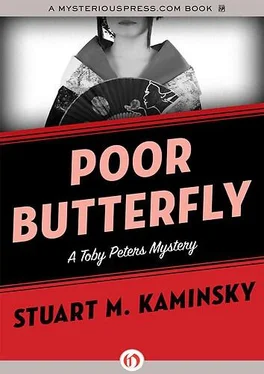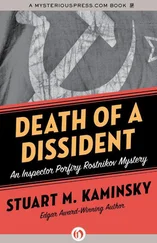Stuart Kaminsky - Poor Butterfly
Здесь есть возможность читать онлайн «Stuart Kaminsky - Poor Butterfly» весь текст электронной книги совершенно бесплатно (целиком полную версию без сокращений). В некоторых случаях можно слушать аудио, скачать через торрент в формате fb2 и присутствует краткое содержание. Жанр: Криминальный детектив, на английском языке. Описание произведения, (предисловие) а так же отзывы посетителей доступны на портале библиотеки ЛибКат.
- Название:Poor Butterfly
- Автор:
- Жанр:
- Год:неизвестен
- ISBN:нет данных
- Рейтинг книги:4 / 5. Голосов: 1
-
Избранное:Добавить в избранное
- Отзывы:
-
Ваша оценка:
- 80
- 1
- 2
- 3
- 4
- 5
Poor Butterfly: краткое содержание, описание и аннотация
Предлагаем к чтению аннотацию, описание, краткое содержание или предисловие (зависит от того, что написал сам автор книги «Poor Butterfly»). Если вы не нашли необходимую информацию о книге — напишите в комментариях, мы постараемся отыскать её.
Poor Butterfly — читать онлайн бесплатно полную книгу (весь текст) целиком
Ниже представлен текст книги, разбитый по страницам. Система сохранения места последней прочитанной страницы, позволяет с удобством читать онлайн бесплатно книгу «Poor Butterfly», без необходимости каждый раз заново искать на чём Вы остановились. Поставьте закладку, и сможете в любой момент перейти на страницу, на которой закончили чтение.
Интервал:
Закладка:
“That would probably have pleased Mr. Keel,” said Gunther.
Shelly looked as if he were going to say something but decided to keep it to himself. I knocked and Lundeen sang for us to enter.
Long sheets of paper covered the floor, desk, and table. Lundeen stood over the table looking down, a handkerchief in his hand to dry his palms. Gwen was asleep in an overstuffed chair in a corner, a sheet of paper on her lap, her mouth open.
Lundeen looked at the four of us. His jaw dropped. He touched his stubbly face, closed his mouth, and pulled himself together.
“My colleagues,” I said, and introduced everyone. Lundeen was quite an actor. He smiled politely and shook each hand.
“Welcome, gentlemen,” he said. “Mr. Peters, Gwen and I have spent the night going over the statements you asked us to obtain. Gwen will put it all together after she has some rest. But as far as we can tell, everyone from the custodial staff to me and the Maestro were seen either when the plasterer was being killed or when Lorna and you were attacked. It must have been someone from the outside.”
“I would like to examine these reports, if I may,” said Gunther.
“Yes, of course,” Lundeen conceded.
Shelly had wandered over to the sleeping Gwen. “Good teeth on this girl,” he said appreciatively, coming back to us. “Slight overbite.”
“What now?” asked Lundeen. “Vera, Marty Passacaglia, the Maestro, and the orchestra will be here in the next few minutes. What do we …?”
“My colleagues are experienced at this kind of thing,” I said, pretending to look at one of the sheets of paper.
Lundeen rubbed his eyes and looked at us with disbelief.
“Got some questions,” I said, looking up. “Last night I ran into the Reverend Souvaine, the guy behind the picketers. He said he’s going to drop a publicity bomb today, that he has proof Stokowski is a liar-that he isn’t Polish, that he can’t play the violin-that he has been fooling around with women for years.”
“All true,” said Lundeen with a sigh, standing up to straighten his shirt front. “The Maestro is a storyteller and a mass of contradictions. He values his privacy but enjoys adulation. He changes his biography. His accent is a fraud, a mixture of precise English and playful European pronunciations. He is an accomplished organist, a virtuoso. There is no reason for him to claim the violin. Yet he does so. His exploits with women are legendary in the business. Your Reverend …”
“… Souvaine,” I said.
“… will get a few lines in the paper, but there is nothing the community does not know about the Maestro,” Lundeen concluded. “Now, if you don’t mind, I’d like to change my shirt, shave, and try to look presentable. The Maestro doesn’t like slovenliness. You might want to get your people down to the lobby before he arrives.”
Lundeen moved toward a door in the right wall, opened it, and disappeared.
“I am able to confirm what Mr. Lundeen has said about Leopold Stokowski,” said Gunther. “The discrepancies have been evident for a long time.”
Gwen sat up suddenly and found herself looking at Shelly.
She stifled a scream, her eyes searching for help. She saw Gunther and then Jeremy. Her mouth opened and her eyes found me.
“Good morning,” I said.
“Bad dream,” she whispered hoarsely, trying to sit up.
Gunther moved to help her.
“Thank you,” she said. “Mr. Lundeen …?”
“Shaving,” I said.
“He told you what we found? Or failed to find?”
“Perhaps you would not mind summarizing your information for me,” said Gunther.
Gwen touched her hair and sat up.
“Okay, Gunther, you stay here and work on the statements,” I said. “If we have anything to add, we’ll bring it to you. You keep an eye on Gwen.”
“Of course,” he said.
Jeremy, Shelly, and I left the room.
We made it to the lobby just in time. Members of the orchestra were coming in, carrying instruments, talking, pointing out grotesque designs and rococo corners. Behind them, a light coat over his shoulders, came Stokowski, with Lorna and Miguelito at his side. Under his coat Stokowski wore a gray suit with a black shirt and white tie. He looked like a king going to a costume ball dressed like a movie gangster. He looked up at me as he entered.
“Ah, my detective,” he said. “What have you discovered?”
“Everyone has an alibi for everything,” I said.
“As is always true in detective fiction,” he said.
I introduced Shelly and Jeremy. Stokowski shook their hands.
“I am an admirer of your work,” Jeremy said.
Stokowski nodded, having heard it before, the polite response of someone who meets a celebrity.
“Exclusively of my work?” he asked with a wry smile.
“No,” said Jeremy. “Not exclusively. I enjoy the New York Philharmonic, though I find them a bit too formal under Bruno Walter, except when they are doing Beethoven. The London Philharmonic under Sir Thomas Beecham is suited for Debussy, although not for the more intense composers, and while Felix Weingartner and the London Symphony have a remarkable range, they have, in my opinion, no singular identity or strength. Admittedly, my familiarity with these orchestras is through recordings, the quality of which varies greatly. Your recordings, however, are consistently of the highest quality. In addition, I find your dedication to modern composers and your willingness to deal with the most difficult classics admirable. In my opinion, only your friend Artur Rodzinski, with the Cleveland Orchestra, approaches your virtuosity.”
Stokowski had stopped and was regarding the large bear-like bald man in front of him.
“You are a musician?” he asked.
“A poet,” Jeremy said.
“Used to wrestle,” said Shelly. “Pro. Broke Tiger Daniels’ arm in Pittsburgh in 1930.”
Stokowski looked at Jeremy and smiled. “I look forward to talking with you further.”
He pulled the coat around his shoulders and hurried into the building.
“Are you all right?” I asked Lorna. She wore a scarf around her neck. I had a flash image of her red neck from my dream.
“No,” she said, looking around at the workmen and up the stairway. “And Miguelito couldn’t sleep. He was traumatized.”
“Shelly, will you accompany Miss Bartholomew while she is in the building?” I said.
“Sure,” said Shelly, taking Lorna’s arm. Miguelito took a snap in his direction and Shelly let go.
We heard his voice as he led her away: “Little fellow has a nice smile there, but there’s just a slight underbite, and his teeth need cleaning.”
“Stay with Stokowski,” I told Jeremy.
Jeremy nodded and moved silently toward the auditorium.
Vera came in about two minutes later, but she wasn’t alone. A tall blond man was laughing at her side. She was smiling. The man wasn’t just tall. He was also muscular and handsome. Then Vera spotted me and the smile, disappeared.
The two of them moved toward me.
“I’m sorry about last night,” she said. “Lorna’s much better.”
“I saw her,” I said. “Inside. Let’s try for those carrot sandwiches tonight.”
“Who is this?” asked the man with Vera.
“I’m sorry,” Vera said, clearly flustered. “This is Mr. Peters, the detective Maestro Stokowski has hired. Toby, this is Martin Passacaglia.”
I put out my hand. Passacaglia took it and gave it his best. He was about fifteen years younger than me and in good shape, but it was body-building shape, not scar tissue shape. I let him squeeze.
“Good to meet you, Peters,” he said. His voice sang-I liked that voice, reminded me of Robert Preston. “Let’s get inside, Vera. Stoki will be waiting,” he added.
Читать дальшеИнтервал:
Закладка:
Похожие книги на «Poor Butterfly»
Представляем Вашему вниманию похожие книги на «Poor Butterfly» списком для выбора. Мы отобрали схожую по названию и смыслу литературу в надежде предоставить читателям больше вариантов отыскать новые, интересные, ещё непрочитанные произведения.
Обсуждение, отзывы о книге «Poor Butterfly» и просто собственные мнения читателей. Оставьте ваши комментарии, напишите, что Вы думаете о произведении, его смысле или главных героях. Укажите что конкретно понравилось, а что нет, и почему Вы так считаете.












